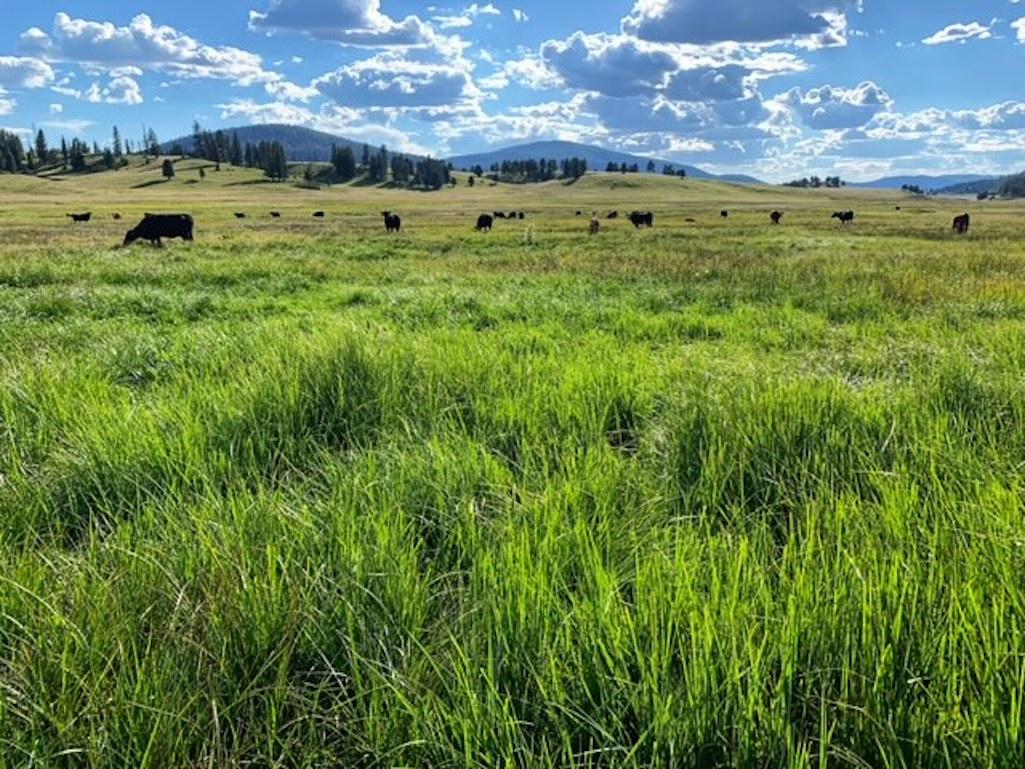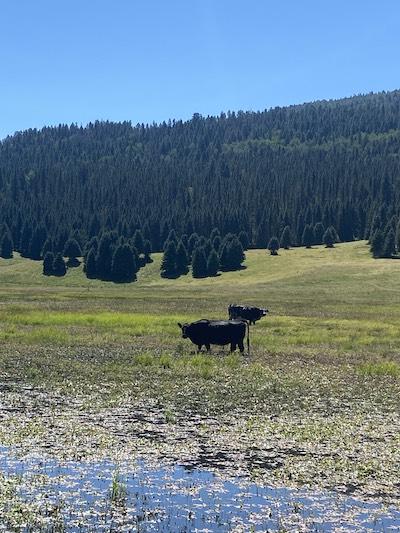
Conservation groups say these cattle are trespassing in Valles Caldera National Preserve/Western Watersheds Project
Illegal livestock grazing at Valles Caldera National Preserve in New Mexico has drawn the threat of legal action against the National Park Service by conservation groups that maintain the cattle are causing damage to important wildlife habitat.
A notice of intent to sue the federal agency was filed Wednesday by WildEarth Guardians, Western Watersheds Project, and Caldera Action. Valles Caldera was set aside as a national preserve to protect its unique ecosystems, headwaters, and thriving elk herds, yet "for years, cattle have illegally entered the VCNP from neighboring Forest Service grazing allotments, causing damage to streams, riparian areas, and important wildlife habitat," the groups claim. Despite voiced concern over the situation, the groups maintain the Park Service has failed to address the issue.
In his October 2021 confirmation hearing, Park Service Director Chuck Sams promised U.S. Sen. Martin Heinrich, D-New Mexico, that he is “committed to figuring a way to ensure that there are no trespass issues.”
So far, this promise has gone unfulfilled as more than 100 cattle have been documented in Valles Caldera meadows for most of the past summer, the conservation groups allege.
“I feel a deep sense of betrayal,” said Madeleine Carey, Southwest conservation manager for WildEarth Guardians. “We were promised this persistent issue would be dealt with and if anything, things have gotten worse. No one from the Park Service has responded to our emails about the cows this summer.”

This photo of cattle in a riparian area of Valles Caldera was taken in September/Madelaine Carey
Even the New Mexico Livestock Board agrees the issue needs attention, the groups said. In June 2019, NMLB passed a unanimous motion to hold a meeting with the Park Service to develop a solution. Still, the issue of trespass persists, the groups added. As recently as October 8th, dozens of cattle were spotted in the Valle San Antonio and Valle Toledo, an area closed to cattle grazing under Park Service regulations, they said.
“We worked for years with others to get the Valles Caldera into the National Park System because the Park Service has the highest standards of land protection of any federal agency,” said Tom Ribe, executive director of Caldera Action, a nonprofit focused on the Jemez Mountains. “We trusted they would protect the Caldera from all sorts of possible damage. They closed the majority of the preserve to cattle grazing but then looked the other way while cows flooded in across vandalized and damaged fences. We have no idea why the management doesn’t respond to this blatant trespass. It is not consistent with Park Service policies.”
The National Park Service does not comment on legal action.
In a press release, the three groups said that "at the beginning of the grazing season in May, volunteers documented the condition of the northern boundary fence between National Park Service and U.S. Forest Service lands. Much of the boundary fence was laying on the ground, cut, or otherwise rendered inoperable. Though the National Park Service has replaced miles of fence, vandalism, tree-falls, and aging fencing continue to allow cattle trespass."
By federal contract, U.S. Forest Service-permitted ranchers are not allowed to graze outside of their specific grazing leases. The Forest Service does not enforce the terms of these contracts when the cattle trespass on national park lands, according to the conservationists.
“Livestock trampling riparian areas of these protected lands has gone on far too long with federal land managers doing too little to stop it,” said Cyndi Tuell, Arizona and New Mexico director of Western Watersheds Project.
Livestock entering Valles Caldera have been documented by the Park Service and Forest Service since at least 2017.
“It’s frustrating that the Park Service is breaking its promise to New Mexicans to protect the natural resources in Valles Caldera and has let this situation fester for more than five years. Species on the brink of extinction like the Jemez Mountain salamander need swift action, not agency foot-dragging,” said Tuell.

 Support Essential Coverage of Essential Places
Support Essential Coverage of Essential Places



Comments
" leases allow for fences"
Not in the typical lease.
And the typical NM grazing lease isn't anywhere near "cheap". How do we know this? You don't find NM ranchers falling over each other, clamoring for one of those cheap USFS grazing leases.
The fact remains: the usual responsibility for erecting and maitaining fences lie with the landowner--in this case, the USFS.
Look, I agree that these cattle should not be on NPS property if there's no grazing lease for the NPS property. But solving this particular problem is not as easy as you make it; otherwise it would have been resolved years ago.
A Johnson - there are a lot of things that can be easily solved but aren't because people don't like the solution or are too lazy to try. Confiscate those cattle as NM laws provides and the trespass will come to a screeching halt. As to the cost of the leases, there have been many of time people have complained here that the lease costs on Federal Lands were well below those on private property. Thats fine by me as it is the American consumer that benefits. But if cows are a problem in Valles, in my opinion, it is the cattlemans responsibility to address it, not the victimized NPS.
By the way A johnson. Montana's averge monthly per head grazing lease runs $26. The US western rate on federal lands is $1.35. That leave's a lot of margin to build a fence.
Do you seriously believe american consumers benefit by giving producers sweetheart deals? Beef is a commodity industry and the individual producer is just going to make more money at our expense instead of reducing prices.
Benefits - please take an economics class. Gas is a commodity industry and the price fluctuates dramatically as the availability and cost of oil changes. Same with the cost of meat. Its the beauty of capitalism.
John A is absolutely right.
Talk is cheap. If the NPS wants a solution they should find the money to build their own fence and hire the staff to keep the cows out. Otherwise we will still be talking about this for years to come.
Wrong issue addressed here.
Valles Caldera is a National Preserve, NOT a National Park. Livestock are totally appropriate generally, and especially here where the history of the place is as a ranch.
The language of the plainiffs exposes the entire move to include more and more lands under the NPS. Get land under NPS jurisdiction and then AGITATE AGITATE AGITATE until you get wilderness protection. These people want to end the beef industry under the Marxist mantra of envirnomental justice to combat climate change. This is just one step in that continuum.